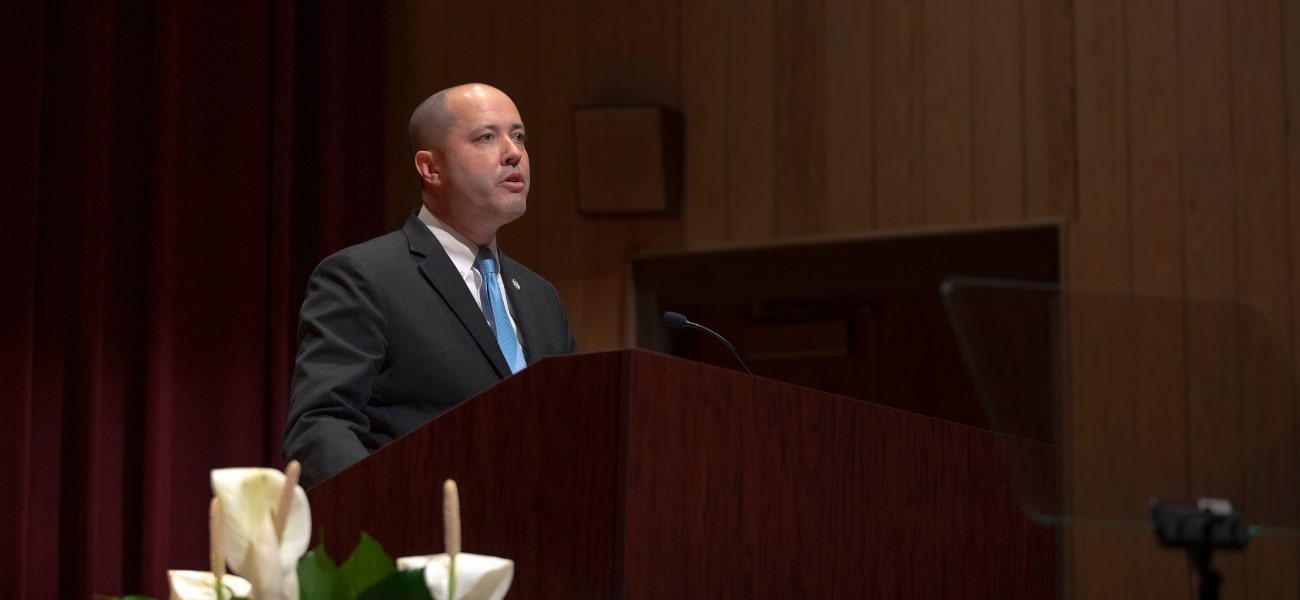Stay ahead of the curve as a political insider with deep policy analysis, daily briefings and policy-shaping tools.
Request a DemoMeet Chris Carr: Georgia’s Attorney General Eyeing Reelection

Credit: Office of Gov. Brian Kemp
- Playmaker: Chris Carr
- Role: Georgia Attorney General
- Tenure: November 2016 to present
As his mother tells it, Georgia Attorney General Chris Carr – when he was four years-old – cried over former Republican President Gerald Ford’s loss to Democratic then-challenger Jimmy Carter.
A few years later, Carr went against the grain from his classmates by choosing the role of Republican candidate Ronald Reagan during a fourth-grade mock presidential debate. Most everyone else wanted to be Carter.
From his youth in a staunchly Republican family, to serving as the late U.S. Sen. Johnny Isakson’s chief of staff, to becoming one of Georgia’s top elected officials, Carr has had no shortage of political influences in his life. He’s also represented the state government in a series of controversial lawsuits dealing with abortion restrictions, election integrity and federal COVID-19 vaccine mandates.
This year, Carr aims to fend off a challenge from Democratic state Sen. Jen Jordan (D-Atlanta) to keep the attorney-general post he’s held since 2016. He takes a tough-on-crime approach against gang activities and human trafficking, while letting a faith in the rule of law guide him through the recent public storm of fraud claims from the 2020 presidential election.
State Affairs sat down with Carr this week for a conversation about his political career, accomplishments in office and what he hopes to achieve if elected to another four-year term. His answers have been edited for length and clarity.
What was the professional path that led to your current role?
“A lot of my colleagues were in private practice or (were) prosecutors,” Carr said. “But I’ve had this legislative, economic development and legal background, which is just a little bit different.”
Carr’s first brushes with politics came early in life, starting when he met Johnny Isakson’s son, Kevin, at the University of Georgia. After volunteering for Isakson’s failed 1996 U.S. Senate campaign, Carr earned a law degree and soon joined the Georgia Public Policy Foundation as general counsel under then-president T. Rogers Wade, who served as former U.S. Sen. Herman Talmadge’s chief of staff in the 1970s.
“I’d go into Rogers’ office at like four o’clock in the afternoon and he’d just tell me stories about Georgia politics,” Carr said. “I love history and I love politics.”
Back on the campaign trail, Carr rose to become Isakson’s chief of staff in 2007 after helping him win a seat in Congress, then in the U.S. Senate. “Wherever Johnny was, that’s where I was,” Carr said. Over the next few years, Carr got to know Isakson’s fellow then-U.S. Rep. Nathan Deal, who as Georgia governor appointed Carr first as the state’s economic-development commissioner in 2015, then as attorney general the following year. Carr won a full term by a narrow margin in 2018.
“I think we’ve all been fortunate to have people who looked out for us and maybe gave us a chance when we weren’t quite ready, but they saw something in us,” Carr said. “I think I’ve been fortunate to really be able to be the beneficiary of that.”

Georgia Attorney General Chris Carr (right) served as former U.S. Sen. Johnny Isakson’s (left) chief of staff. (Credit: Chris Carr via Facebook)
What is a defining moment in your life or career that helped guide you to this role?
“I don’t have a defining moment,” Carr said. “I have defining individuals.”
Isakson, who died in December 2021 at age 76, still looms large in Carr’s career and life. Famed for working across the aisle in the Senate, Isakson offered Carr a front-row seat on how form lasting relationships in government.
“This philosophy he had (was that) there’s only two types of people in the world: friends and future friends,” Carr said of Isakson. “He knew how to bring people together.”
Carr also counts a mentor in Deal, who was Georgia’s governor from 2011 to 2019. A hallmark of Deal’s administration was passage of several criminal-justice reform measures including the creation of alternative-sentencing courts, which Carr supports even as the current Gov. Brian Kemp focuses more on toughening penalties for criminal offenders.
“(Deal) had a great philosophical point that he always made,” Carr said. “He said, look, we’ve got to separate those that we’re scared of from those that we’re mad at, and get help for those we’re mad at. Accountability courts came from that.”

Georgia Attorney General Chris Carr (right) stands with former Georgia Gov. Nathan Deal (left) in 2015. (Credit: Georgia Department of Economic Development)
What are your most major accomplishments throughout your career?
Carr credits several policing initiatives set up during his tenure as high points of his time in office. These include recently created task forces to prosecute gang members and human traffickers and to curb opioid abuse in Georgia.
“It’s the paramount duty of government to protect person and property,” Carr said. “Everything flows from safety. Everybody deserves to be safe. Every single Georgian.” Another watershed moment for Carr came when his office stepped in to assist prosecuting two men convicted of murdering Ahmaud Arbery near Brunswick. The case garnered national attention after video surfaced showing the two men, Travis and Gregory McMichael, confront and gun down Arbery while he was jogging in February 2020.
“Our goal is maximum justice for Ahmaud Arbery,” Carr said. “For his family, for the community, the state and the nation.”

Georgia Attorney General Chris Carr honors local police officers at the Peace Officers Association of Georgia’s annual training conference in August 2021. (Credit: Office of Gov. Brian Kemp)
What challenges and criticism have you faced during your time in leadership?
Since taking office, Carr has had a steady diet of high-profile, controversial lawsuits amid intense partisan divide in Georgia and across the U.S. He’s represented the state government in defending passage of a strict abortion bill in 2019; fought dozens of cases challenging the 2018 gubernatorial and 2020 presidential elections; and battled the federal government over COVID-19 vaccine mandates for big employers, federal contractors and health-care workers.
“I believe in the rule of law,” Carr said. “As an executive-branch officer, it’s my job to enforce the law. If you don’t like the law, if somebody doesn’t like what it is at the state level, you go across the street to the Capitol, join the legislature, make your case.”
Vaccines have been a particularly tough subject for Carr, who encourages Georgians to get COVID-19 shots and boosters while also opposing mandates brought by President Joe Biden’s administration.
“That’s an interesting case because I’m actually pro-vaccination,” Carr said. “It seems like to me, you look at the data, it’s very successful. But I don’t believe that the government – and particularly the president of the United States – has the authority to do what he did.”
Like many top Georgia Republicans, Carr has weathered a storm of unfounded election-fraud claims lobbed by former President Donald Trump’s supporters following the 2020 election. He draws a parallel to claims of voter suppression from gubernatorial candidate Stacey Abrams’ backers during her losing campaign against Kemp in 2018.
“I take the position (that) I’m anti-misinformation,” Carr said. “Whether it’s coming from the left or whether it’s coming from the right, the brand that is Georgia is being harmed when misinformation is out there.”

Georgia Attorney General Chris Carr speaks at the Georgia Republican Party’s annual convention at Jekyll Island in June 2021. (Credit: Beau Evans for State Affairs)
What are your plans for what you want to accomplish going forward?
Boosting support for Georgia’s gang-fighting task force is Carr’s top priority in the legislative session currently underway at the State Capitol. During this interview, Carr kept tabs on a bill that would give his office authority to prosecute gang-related crimes statewide. It advanced out of the Georgia House of Representatives by a nearly party-line vote on Feb. 14.
“We’ve got kids as young as the fourth grade that are getting recruited,” Carr said. “When you start looking at gang activity, you’ve got 50% or 60% of all violent crime is somehow gang-affiliated. And what communities are most often terrorized by gangs? Lower-income, racially diverse and immigrant populations.”
Carr also wants to tap a recent settlement with several pharmaceutical companies to provide treatment services for opioid abusers before they run afoul of police.
“We’re hearing from sheriffs who are arresting the same people over and over again because we just don’t have any treatment options,” Carr said. “What we’re trying to do (is) provide resources so there are treatment options particularly in exurban and rural parts of the state.”
Which Georgia elected officials and leaders should we profile next? Share your thoughts/tips by emailing: [email protected].
Header image: Georgia Attorney General Chris Carr attends a memorial ceremony for fallen police officers in May 2021. (Credit: Office of Gov. Brian Kemp)
Professionals still face licensing delays amid state’s transition to online system
The Gist Georgia’s professionals and business owners are still struggling to obtain professional licenses in a timely manner. As the Secretary of State’s Office rolls out its new Georgia Online Application Licensing System to expedite the process, the efficiency of this new process is being put to the test. What’s Happening Thursday morning at the …
Controversy over AP African American Studies class grows
Rashad Brown has been teaching Advanced Placement African American Studies at Atlanta’s Maynard Jackson High School for three years. He’ll continue to do so — even though the state’s top education official removed it from the list of state-funded course offerings for the upcoming school year. While Brown prepares to start teaching his class on …
Students, teachers, lawmakers blast decision to end AP African American history classes
ATLANTA — A coalition of lawmakers, civil rights leaders, clergy, educators and students Wednesday called on the state’s education czar to rescind his decision to drop an advanced placement African American studies class from the state’s curriculum for the upcoming school year. “This decision is the latest attack in a long-running GOP assault on Georgia’s …
Kamala Harris’ presidential bid reinvigorates Georgia Democrats
Georgia Democrats have gained new momentum heading into the November election, propelled by President Joe Biden’s decision to bow out of his reelection bid and hand the reins to Vice President Kamala Harris. The historic decision, announced Sunday, is expected to prove pivotal in the national and state political arenas and breathe new life and …




